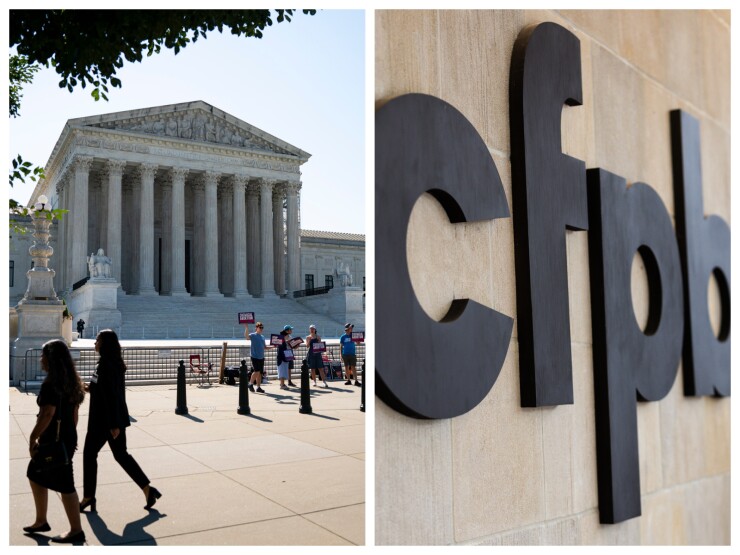
In its 13-year history, the Consumer Financial Protection Bureau has survived two major
Supreme Court challenges, either of which could have defanged the agency.
But the CFPB is not out of the woods. A forthcoming Supreme Court decision, which is expected to be released within the next few weeks, could take a major bite out of the agency's rulemaking powers.
The pending decision will determine how much deference the courts give to regulators in interpreting the laws that give them the power to write rules. It has big implications for not just the CFPB — and U.S. banking regulation more generally — but for federal agencies that oversee a broad range of industries.
Experts say the stakes of a ruling that curtails regulatory power, which is widely seen as the likeliest outcome, are particularly large for the CFPB. The consumer bureau has a reputation as being more aggressive than some other federal agencies. During the Biden administration, companies have not been shy about suing to challenge its regulations.
"It puts consumer protection in real jeopardy," said Susan Weinstock, CEO of the Consumer Federation of America, a consumer advocacy group. "We'll have judges making these decisions, and they could end up being not based on facts, and not based on what's happening in the marketplace."
Industry lawyers have a different view of the CFPB's work — they generally believe that the agency has shown a tendency to reach beyond its statutory authority — but they agree that the consumer bureau will be a particularly ripe target for corporate litigants if the Supreme Court reins in regulators' power.
"It would not be a good situation, to put it mildly, for the CFPB," said Alan Kaplinsky, senior counsel at Ballard Spahr.
At stake in a pair of cases currently pending before the high court is the future of a legal doctrine known as Chevron deference, which got its name from a landmark Supreme Court decision in 1984.
The key tenet of the 40-year-old decision is that when there is ambiguity about the meaning of federal laws, judges should give deference to agencies' interpretations. If that deference goes away, the courts will have greater latitude to overturn the agencies' rules.
The CFPB, which is the brainchild of Sen. Elizabeth Warren, D-Mass., has been a political lightning rod since it was established during the Obama administration.
But so far, when CFPB rules have been invalidated, it has not typically happened through the courts. A 2017 agency rule barring companies from including mandatory arbitration clauses in consumer contracts
In 2019,
Since Rohit Chopra took the agency's reins in 2021, industry groups have shown greater willingness to challenge the CFPB's regulations in court. And while those litigants suffered a setback in May, when the Supreme Court upheld the CFPB's funding mechanism, they would get a boost from a ruling that undermines Chevron deference.
"It decreases the likelihood of success of the CFPB with respect to all of these regulations that have already been challenged in court," Kaplinsky said.
For example,
A third pending lawsuit challenges
Chris Willis, an attorney at Troutman Pepper, pointed to the CFPB's interpretation of the word "applicant" under the Equal Credit Opportunity Act as another area of potential vulnerability if Chevron deference goes away.
The 50-year-old anti-discrimination law offers protections to prospective applicants, in addition to people who have already applied for a loan, according to the CFPB's regulations. But the agency's interpretation is at issue in
"In a world where Chevron is no longer, an interpretation like that, that the industry may not agree with, could become subject to successful challenge in court," Willis said.
Future CFPB regulations, too, would be on shakier ground in a scenario in which the courts give less deference to federal agencies.
In January,
The financial services industry could benefit in certain situations from a Supreme Court ruling that limits or overturns Chevron deference, Willis said. He pointed to situations where regulators have used expansive interpretations of federal laws to write regulations that industry actors oppose.
But he also noted that the demise of Chevron deference could have downsides for companies that rely on the clarity and specificity that various regulations provide.
Trial lawyers could bring legal challenges against regulations from federal regulators that can make it harder to sue banks.
And state attorneys general, some of whom have long sparred with federal banking regulators over the reach of state laws, could bring suits challenging so-called preemption guidance that has generally drawn support from the industry. The Office of the Comptroller of the Currency and the Federal Deposit Insurance Corp. have both issued interpretations regarding preemption.
"It's impossible to say, as a blanket rule, that the industry is in favor of Chevron being overturned," Kaplinsky said. "I would say just the opposite — that in general, the industry likes certainty, and things that have been well established in the law."
One example of that perspective was on display last year in
"Lenders, servicers, and consumers have operated by the CFPB's guideposts for more than ten years, and without those rules substantial uncertainty would arise as to how to undertake mortgage transactions in accordance with federal law," the trade group wrote.
Daniel Wolff, a partner at the law firm Crowell & Moring, said that Chevron deference has always had policy implications that cut in opposite directions. He thinks that some observers have exaggerated the likely impact of the legal doctrine's demise. Still, he predicted that in a post-Chevron world, regulators that stray from their central duties will be more likely to get their wings clipped.
"Agencies will just have to hew closer to their core mission," Wolff said.






